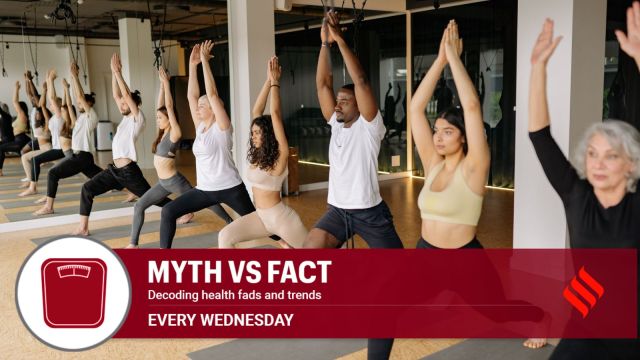Can regular exercise cancel the effects of a high-calorie diet?
Many believe an hour of cardio or weightlifting will erase any damage but here’s the math
 Eating nutrient-dense foods fuels your workouts, improves recovery and supports overall health.
Eating nutrient-dense foods fuels your workouts, improves recovery and supports overall health.Most people believe that they can eat whatever they want as long as they exercise diligently and burn the calories. This concept is far from accurate and its oversimplification does not align with the principles of fitness.
For many, this myth translates into indulging in high-calorie, nutrient-deficient foods and assuming that an hour of cardio or weightlifting will erase the damage. On the surface, the math might seem to check out. If you consume 500 calories from a fast-food meal and burn 500 calories during your workout, shouldn’t you break even? Unfortunately, the human body is far more complex than a simple input-output equation.
The fact is diet and exercise are not equal players. “Not all calories are created equal. A 500-calorie serving of fried chicken has a vastly different nutritional profile compared to 500 calories from a quinoa salad with vegetables and lean protein. While the calorie count might be the same, the latter provides essential nutrients, fibre and energy to support bodily functions, while the former is high in unhealthy fats, sodium and empty calories.
Eating nutrient-dense foods fuels your workouts, improves recovery and supports overall health. In contrast, relying on junk food can lead to energy crashes, inflammation and long-term health issues like heart disease and diabetes, regardless of how much you exercise.
Exercise vs Calories
A common misconception is that workouts burn vast amounts of calories. In reality, even intense sessions of running or cycling typically burn between 300 and 600 calories per hour. This is equivalent to a single sugary beverage or a slice of pizza. Overestimating how many calories you’ve burned can lead to overeating, undermining your efforts.
Hormonal balance and weight management
What you eat influences your hormones, which play a critical role in weight regulation. For instance, consuming too much sugar spikes insulin levels, promoting fat storage. On the other hand, a diet rich in protein, healthy fats and complex carbs supports hormonal balance, helping you maintain a healthy weight. Exercise alone cannot counteract the effects of a poor diet on your hormonal health.
Exercise alone can’t fix nutrient deficiencies
You can’t outrun a bad diet when it comes to deficiencies. Essential nutrients like vitamins, minerals and antioxidants come from whole, unprocessed foods. Regular exercise amplifies your body’s nutrient requirements, and if your diet is lacking, you’ll likely experience fatigue, poor recovery, and an increased risk of injury.
The key to a sustainable and healthy lifestyle lies in balancing diet and exercise. Here’s how you can achieve it. Simply adopt the 80/20 rule. Focus on eating nutritious, whole foods 80% of the time and allow for indulgences 20% of the time. This ensures you meet your nutritional needs without feeling deprived. Exercise enhances the benefits of a healthy diet. Even healthy foods can contribute to weight gain if eaten in excessive quantities. Be mindful of portion sizes.
(Narang is nutritionist, Apollo Hospitals, Delhi)
- 01
- 02
- 03
- 04
- 05































